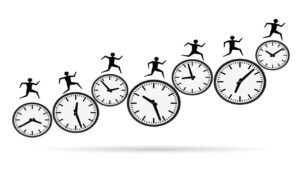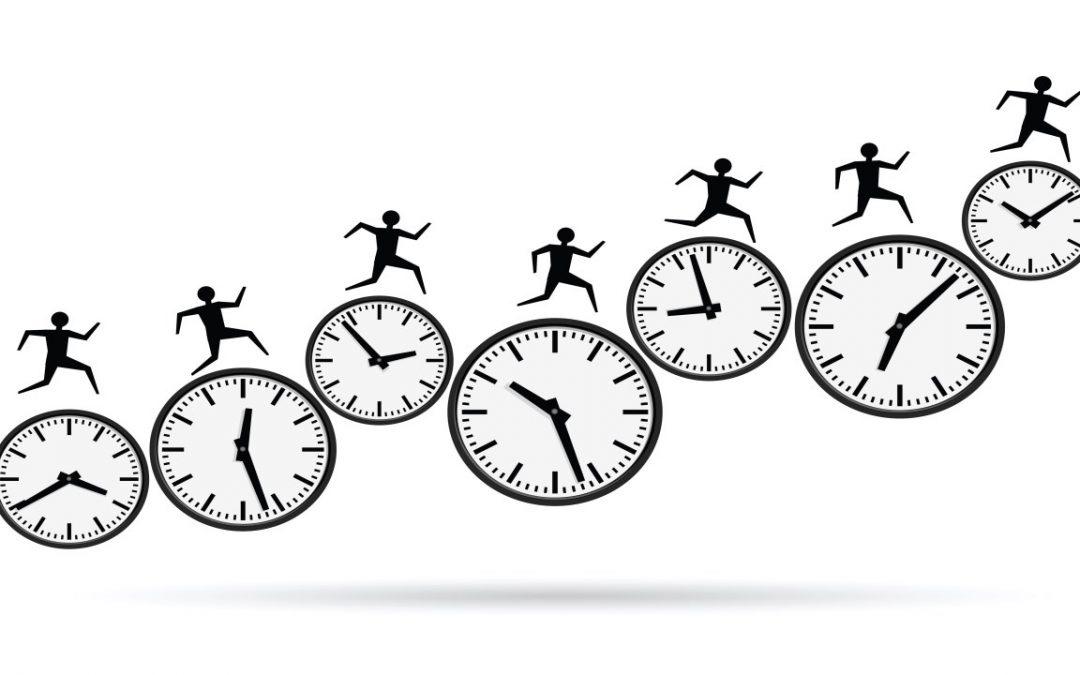
Myth #6. The biggest time wasters are interruptions, which include email, meetings and rush jobs.
I call that a myth because none of those are really time wasters – not if you follow my definition of a time waster, which is an activity, within our control, that does not contribute to either our personal or organizational goals.
Rarely can we control an interruption, and if we can, it no longer becomes an interruption. The same thing with meetings and rush jobs. And yet all of these things could contribute to our goals – especially if one of those telephone interruptions were a customer wanting to buy our product, and our goal was to sell a certain volume of products.
I look upon these as “time obligations”, meaning we are obliged to put up with them as a part of our job.
But the real time wasters are such things as procrastination, perfectionism, poor listening habits, inability to say no, anger, forgetting things due to a failure to write them down and so on. These are all controllable if we manage ourselves effectively with respect to time.
Where people should concentrate when attempting to manage their time, is not on the obligations – at least not initially. They should concentrate on eliminating the time wasters – the things that they can control.
Myth # 7. It’s more efficient to stick to one task until it’s completed.
It sounds efficient but it’s probably impossible. Most of us have a few time-consuming tasks that could go on for days or weeks. But we also have the shorter, usually more urgent tasks that must be done as well. Add to that the interruptions that everyone experiences and you are no longer “sticking to one task.”
Normally people have a dozen or more projects on the go at any one time – each with its own deadline. Other people may need to know when they are going to be completed; but they also need to know how they are progressing. They want status reports.
But even if you only had one large task – say to write a book on your area of expertise, it would still be more effective to work at it in chunks of two hours or less then to work at it steadily from 9 am to 5 pm every day.
For one thing, you are justified in engaging your voice mail and ignoring your email for two-hour stretches, but not 8-hour stretches. People will wait two hours for you to return their calls, but rarely eight hours.
In the same way, you can close your door for two hours, ignore your email for two hours, and even go without a coffee for two hours. .In other words, you would have fewer interruptions from others if you worked at your task a few hours at a time – and you would have fewer self-interruptions as well.
Myth # 8. We should have one planner for the office and a separate planner for the home.
The key word here is, should, because I know times are changing and many companies insist on online planners in the office. This allows for instant communication when setting up meetings etc. Even so, I feel everyone should have a portable, hard copy or electronic planner that goes where they go, whether at the office, home or on the road, that records all their activities, personal, family and otherwise.
That’s why our planner (The Taylor Planner) allows scheduling from 7 am to 10 pm, 7 days per week. I only have one life so I feel I should only have one planner.
Many people have two or more planners – one on their desk, another in their pocket or purse, another on the fridge at home – all for convenience. But it’s not convenient if they mark something in one calendar and forget to record it in another one. When we are at home, we should know what our business commitments are, so we don’t promise things we can’t deliver – and when we’re at the office, we should know our family commitments so we don’t promise time that has already been allocated to our family.
Myth # 9. Technology has increased productivity.
In my opinion, personal productivity has changed very little in the past 30 years in spite of technology. The net result of technology has been to speed up the pace of life. We are working faster, driving faster, communicating faster, eating faster – in short, living faster. The time savings gained by technology have been offset by increases in complexity, choices, interruptions, expectations, stress, delays and errors. Our bodies are not designed to operate at warp speed and we are faced with a variety of ailments to the point that “getting well” has become another time consumer.
We have automatic washers and dryers; but we have more clothes to wash and we wash them more often. Cars go faster; but we have more distances to travel and we have to contend with more traffic, construction, and gridlock. We complete specific tasks quicker; but experience more interruptions and timewasters. And so on.
The good news is that we do have a choice. We can decide what technology we will use, when we will use it and how we will use it. And we can decide what we will do and how fast and for how long we will do it. And one of the biggest challenges is to convince ourselves that multitasking is neither productive nor healthy.
Myth # 10. Time is money
Well, certainly time allows you to earn money. In fact, it is the one resource that allows everything else in life to happen. But to say that time is money is too narrow a view. It seems to suggest that the main purpose of time is to allow you to earn money.
In business it is easy to accept the metaphor. Consultants, attorneys, CA’s, CPA’s actually charge clients based on the hours expended on their accounts. In fact all of us, either directly or indirectly are selling our time. And since time is life, we are trading pieces of our lives for money or other “things”.
And the “other things” are sometimes more important than the money. I prefer the definition “Time is life” for this reason. It places a more realistic value on time. You can always earn more money, but you can never obtain more life. You can only use what has been allocated to you. There just “ain’t” no more!
As Benjamin Franklin said “Do not squander time for that’s the stuff life is made of.”
So if time is life and we love life, we certainly should love time. In which case we won’t treat it so shoddily as to waste it or kill it.
But it is important to manage ourselves in such a way as to show respect for that awesome creation called life. Let’s not trade our very lives for unprofitable, unpleasant or irrelevant activities. Trade it for those things that are important, meaningful and enjoyable to you, and to those close to you.


Recent Comments